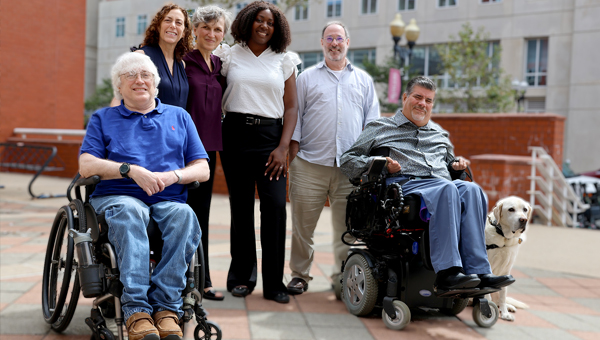
Rutgers University–New Brunswick will launch a new minor this fall in interdisciplinary disability studies — designed to support the lived experience of those with disabilities and examine how society views and understands the meaning and consequences of being disabled.
For more information about the minor, visit https://go.rutgers.edu/disabilitystudies
“I am thrilled that the numerous schools in New Brunswick have come together to create the Disability Studies minor,” said Stuart Shapiro, professor and dean of the Bloustein School. “We are proud to be hosting the minor, which will focus on important aspects of issues related to disability studies — social justice, the expanded roles for disabled people in society, and liberatory cultural reform.”
One in four adults in the United States has some type of disability, according to the Centers for Disease Control and Prevention. This makes disability a natural and common part of the human experience.
The minor will be housed at the Bloustein School and overseen by a committee of faculty from the Bloustein School, the School of Management and Labor Relations (SMLR), the Mason Gross School of the Arts and the School of Arts of Sciences (SAS). Electives for the minor will also be offered by the Schools of Environmental and Biological Sciences, Communication and Information, Social Work and Education.
Carolyn Moehling, professor and vice provost of undergraduate education at Rutgers–New Brunswick said the disability studies minor is a great model for how interdisciplinary collaboration can expand opportunities for students.
“I anticipate that the minor will attract students from many different disciplinary backgrounds and with many different career goals,” she said.
The 18-credit minor consists of three required courses: 1) Introduction to Disability Studies (SMLR); 2) Disability Policy & Law (Bloustein School); and 3) Field Experience for Special Populations (SAS and multiple other schools and programs).
Students will also select three electives from more than 60 options by participating schools and departments. Selected electives can include an array of topic areas that combine into a unique approach to disability studies; students also may specialize within their own major’s elective options.
The field experience requirement will enable students to pursue their specific interests in disability studies in real-world settings at matched university-based locations, local and regional nonprofit organizations and government agencies.
Jeff Friedman a professor at Mason Gross, and SAS professor Javier Robles – both of whom were leaders of the multiyear effort to create the minor – pointed to some of its many benefits for students.
“This minor is an important academic credential for those planning careers in education, health care, advocacy, policy, law, rehabilitation, planning, public health, social services, performing arts and engineering,” said Friedman.
“The minor will offer students the opportunity to recognize, support and advocate—depending on their own self-identifications—for themselves as disabled students and for others living with disabilities,” Robles said.
Lisa Schur, a professor of labor studies and employment relations and co-director of the Program for Disability Research, also helped in the creation of the minor and teaches one of the three required courses.
“I am enthusiastic about this opportunity and welcome students both with and without disabilities,” Schur said. “Rutgers is an international leader in disability research, and in addition to classes and fieldwork experiences, we hope to get students involved in research projects with us.”
Students interested in learning more about the minor may visit https://dev.bloustein.rutgers.edu/undergraduate/minors/ or contact undergrad@ejb.rutgers.edu to set up an appointment with an undergraduate adviser.
